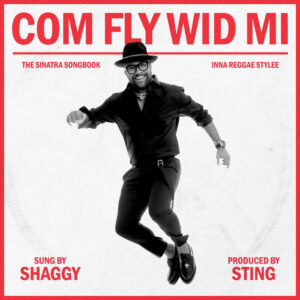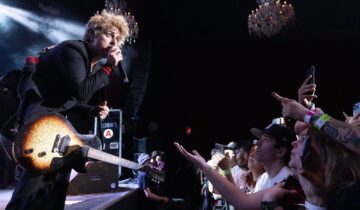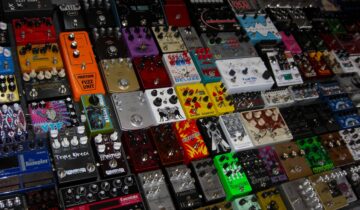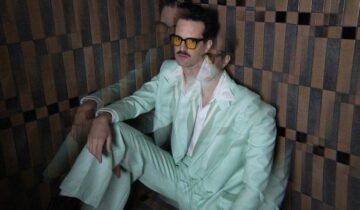 On ‘Com Fly Wid’ Me,’ Shaggy’s second collaboration with Sting, the dancehall toaster-turned-crooner tackles the Frank Sinatra songbook through the lens of reggae. Shaggy spoke with GRAMMY.com about his long history of interpreting the greats.
On ‘Com Fly Wid’ Me,’ Shaggy’s second collaboration with Sting, the dancehall toaster-turned-crooner tackles the Frank Sinatra songbook through the lens of reggae. Shaggy spoke with GRAMMY.com about his long history of interpreting the greats.
By Gary Moskowitz for GRAMMY.COM:
“There’s no need for purist music,” says reggae icon Shaggy, who brought this attitude to an unlikely source.
His latest album, Com Fly Wid Mi, runs Frank Sinatra songs through a filter of ska, swing, and reggae rhythms. On his second collaboration with producer Sting, Shaggy dropped his signature dancehall toasting voice in favor of a new croon, which floats through a range of Ol’ Blue Eyes’ tunes — from “Luck Be a Lady” to “Fly Me To The Moon.”
“Whatever we’re doing has already been done by somebody, but it’s the feel that you put in that makes it different,” Shaggy tells GRAMMY.com. The pair’s unique feel netted Com Fly Wid Mi Best Reggae Album nomination at the 2023 GRAMMYs.
Shaggy — born Orville Richard Burrell — has been making musical nods to his predecessors since 1993. That year, he released a high-energy dancehall version of “Oh Carolina,” a 1958 Folkes Brothers tune that was an early hit in the genre of ska, the precursor to reggae music.
Since then, Shaggy has released more than a dozen albums, often featuring an eclectic range of samples — from Steve Miller Band’s “The Joker” to Cyndi Lauper’s “Girls Just Wanna Have Fun.” He frequently collaborates with artists like will.i.am, Maxi Priest, Spice, Chaka Khan, Sean Paul, and Barrington Levy. Shaggy’s music has won two GRAMMY Awards, a Brit Award and a Juno award; he received an honorary degree from Brown University and a Jamaican order of distinction.
From his home studio in Miami, where he’s worked for many years, Shaggy spoke with Grammy.com about his love of reggae and how Sting helped him learn to appreciate his own voice.
How are you? What have you been up to?
I had a great year. We toured Europe and Australia, and had a really good time. I teamed up with Sting again to do crazy things and we released this album Com Fly Wid Mi. With this project, I didn’t know what we were doing and how it would go. But we had a vision.
But the year was also bittersweet because I lost [bass player and producer] Robbie Shakespeare of Sly and Robbie. He was a mentor of mine, like a father figure to me. We went to the funeral and that was rough.
Shakespeare was one of the greatest musicians and also an amazing person. Humility is the biggest thing he taught me. As a person from the ghetto, he helped me realize my purpose. He would say you’re here as a servant to change people’s lives.
Well you clearly listened. Don’t you think you’ve found your purpose?
In ’93, when we did [a cover of the Folkes Brothers 1959 song] “Oh Carolina,” I was dubbed a one-hit wonder by British tabloids. I had flipped an old song and it went Top 5. It was the first time a dancehall song went to the top.
They said I’d never get another one. They said you’ll never write your own hit. The next record I wrote, it had to be bigger, and I had to write it myself, so I wrote Boombastic” which won a GRAMMY [for Best Reggae Album at the 38th GRAMMY Awards]. So it was off to making history from that point on.
Why did you and Sting decide to interpret Frank Sinatra songs in a reggae style?
Look at artists like John Holt, who wrote “The Tide is High,” which Blondie covered. In his earlier days, he was super popular, and used to do a lot of older American pop songs and soul songs that became part of the Jamaican songbook.
When I listened to [Jamaican radio station] Irie FM in the late ’80s and early ’90s, they played a lot of American music, as well as country music from Kenny Rogers and Dolly Parton. Songs by Bing Crosby, Nat “King” Cole, and Patti Page were played in my house, with chicken and rice and beans for Sunday dinner. Growing up as a young Jamaican, I heard that music a lot. It’s not by chance that Sting heard me singing Sinatra songs for fun.
I became known for my signature dancehall voice from Boombastic, but with Sting in the studio, he heard my real voice. He said you can really sing, you’re not just a dancehall singer. He was in love with my voice and pushed me out of my comfort zone. I’m not really comfortable with my singing, but Sting is a great producer and my big brother, so if he says sing, I will sing, no matter how uncomfortable it is.
Why are you not comfortable with your singing?
I came up in dancehall, so my heroes are Josie Wales, Super Cat, and Shabba Ranks. Those guys are giants. In dancehall I was getting big hits, so I was comfortable only in playing that part, but if you’re comfortable, you are stagnant, and Sting kept pushing me to be uncomfortable.
What unique challenges and opportunities did you both experience turning Sinatra tunes into reggae songs?
The main challenge is that it could easily get corny. Also, Sinatra songs are jazz tunes with five or six chord changes, but most cool reggae is just two chords, so we had to limit the changes to make it cool. So we had to figure out which chords to take out to make it reggae. It can’t be too jazz, or too reggae, so that was the balance.
That’s where the genius of Sting came in. He knew what notes to take out but how to keep the melody that makes it work. That took effort. It’s really cool to know I did something cool that nobody had done.
You’ve worked with Sting twice now, and your previous collaboration with Sting, 44/876, also won a Best Reggae Album GRAMMY Award. How is your work with Sting different from other projects you’ve done?
This is an unlikely pairing. We’re from two different eras, and he’s a giant. We have a good f—ing time bro. We tell jokes and we’re laughing.
He clearly knows way more about music than me, but admires me enough to work with me. In the studio, I’m throwing freestyle and gibberish. He said he had never done that; he’s usually by himself working quietly. He said he had never seen anyone write songs as quickly as me. I write about four songs a day. I never paid attention to the instrumentation as much, but he taught me to pay attention and be a part of it.
Sting said he watched [Aston] “Family Man” [Barrett] play with Bob Marley and tried to emulate him on bass, but couldn’t do it. So he came up with a hybrid, and that became the sound of the Police. He and I agree, there’s no need for purist music. Whatever we’re doing has already been done by somebody, but it’s the feel that you put in that makes it different. There’s always a new story to be told. There’s records you hear, but then there’s records you feel. Like Bob Marley, when he sang, you felt it.
You turned Sinatra’s “Come Fly With Me” into a rocksteady/ska tune and “Oh Carolina” was a remake of Prince Buster’s 1960 ska tune. What’s your connection to the legacy of early reggae/ska/rock steady?
My grandmother was a Christian woman, but she loved Toots and the Maytals, and those ska records were played in my home a lot. It’s ghetto music but fun music, and so danceable.
Dude I make everything from what was made before. I’m not inspired by what is happening now. I’m always thinking, how can we take what was done then and make it unique and cool now? Three days ago I was listening to “Guns of Navarone” by the Skatalites, and wondering how can I use this? I pull a lot of my inspiration from that old stuff.
You’ve won many awards and accolades. Which one feels most special to you?
I’m proud of the JUNO [Canadian Music Award] because I was the only international act to get one. But anyone who gets a GRAMMY is happy.
And here we are again. I’ve been a changer of this reggae genre through and through. I step outside the box, that’s the only way the genre will grow. I take changes, I step out.
Reggae music has gone through so many changes and iterations since its origins in the late 1960s in Jamaica. What do you think is the core element of reggae that gives it such staying power?
Reggae is the first and last music; so many genres have come from it. Reggaeton started from Puerto Rico. It was Spanish reggae, and the Latin community grabbed onto it and it became massive. Look at hip-hop. Kool Herc took Jamaican toasting and put it over R&B beats. When I go to Africa, they play dancehall in the clubs, not Fela Kuti.
The impact Jamaican culture has had on the global culture is incredible. I am blessed to be a reggae artist. Reggae is not an art form, it’s a lifestyle. I get up every day and this is what I’m doing. I don’t want to do anything else. Bruh, I work for the rewards, not the awards. I’m so fortunate. I would do this for free.
What made you want to sing in the first place?
I learned the tone of my voice in the military by singing cadences. I would do these comical cadencies, so they called me out to sing them all the time and it made people laugh. It was hard because we did four or five miles at a time, so that was a lot of singing.
I had no lessons, never had a vocal coach. I started on sound systems and perfected my craft by hanging with great singers like Barrington Levy. The closest I came to real training was with Sting. Anything theoretical was done through Sting.
You’ve been mentored by Sting and Jamaican artists like Robbie Shakespeare, but now you’re also a mentor to younger musicians. How does that make you feel?
After a while life comes to you with a pursuit. James Brown told me once in my dressing room that they can take away your wife and your house, but not your talent. I believed him.
None of those accolades I can take with me, but I can inspire, and change someone’s family. I’m the only musician in my family, and now I have a niece at Princeton. We have changed the cycle of our lives, and that moves me, that excites me.
How has life during the pandemic been for you? Have you stayed busy or have you been taking it easy?
I worked throughout the whole thing. Now I’m excited about production projects with young writers and musicians. I’m like a kid in a candy store. Everybody keeps asking for a Shaggy record. But when Sting says let’s go now, you go now! So we did the Sinatra album. It’s like I’m his little project. But I’m overdue for a Shaggy record.
Will your new record come out in 2023?
I’ve been working on my latest record for the last three years. I have about 100 songs, and keep redoing it. I get inspired over and over again with new stuff. The hardest part is taking stuff out.
Every record from my career has been done in the basement of my house, and I’m still in my basement. I’m still that guy, down with my crew and my team and f—ing with shit, and having fun.
Whatever I do next won’t be what’s expected. If I do what’s expected, then I’ve failed. I’m always looking for that new sound. I make records selfishly to please me. I don’t want to be bored, I’m allergic to boredom. If I’m not bored, then the record is timeless.



